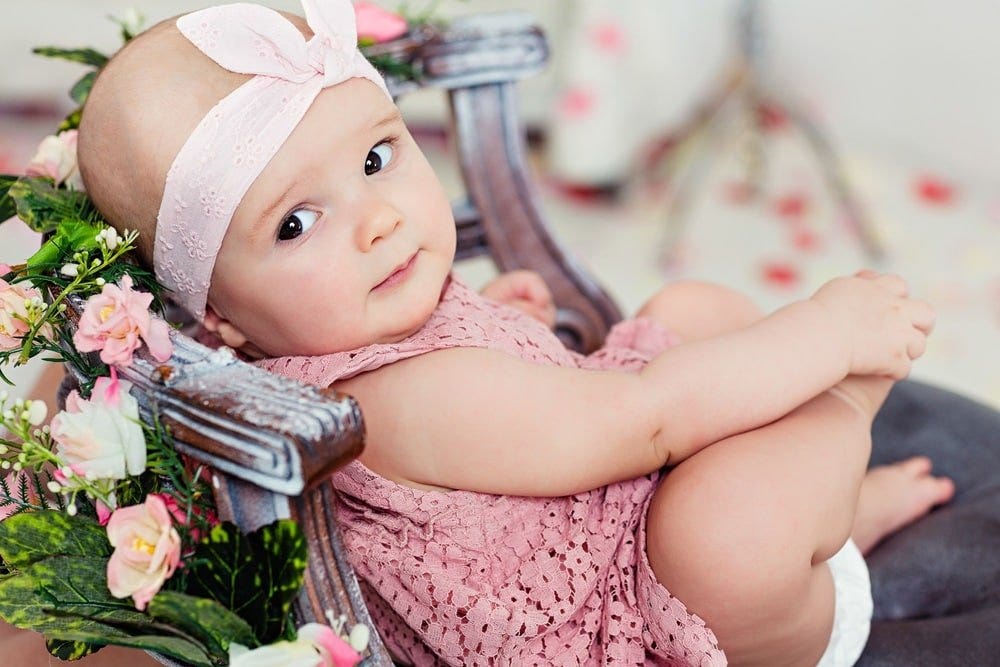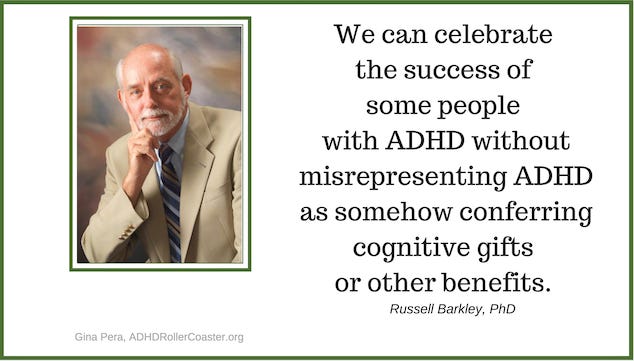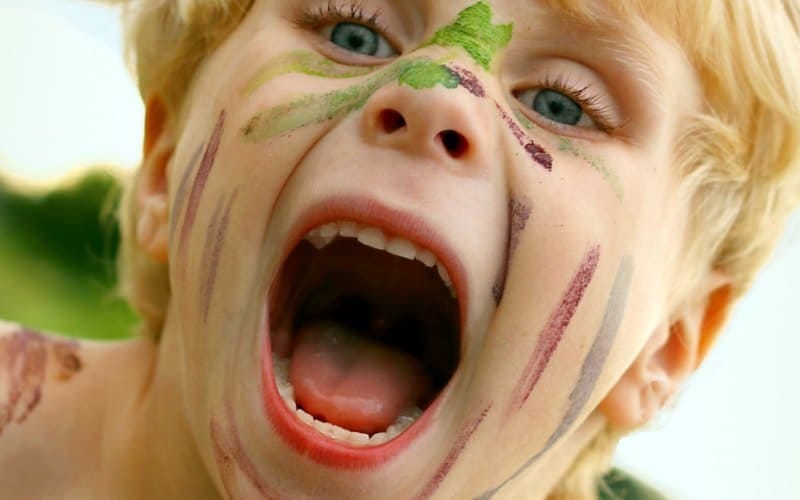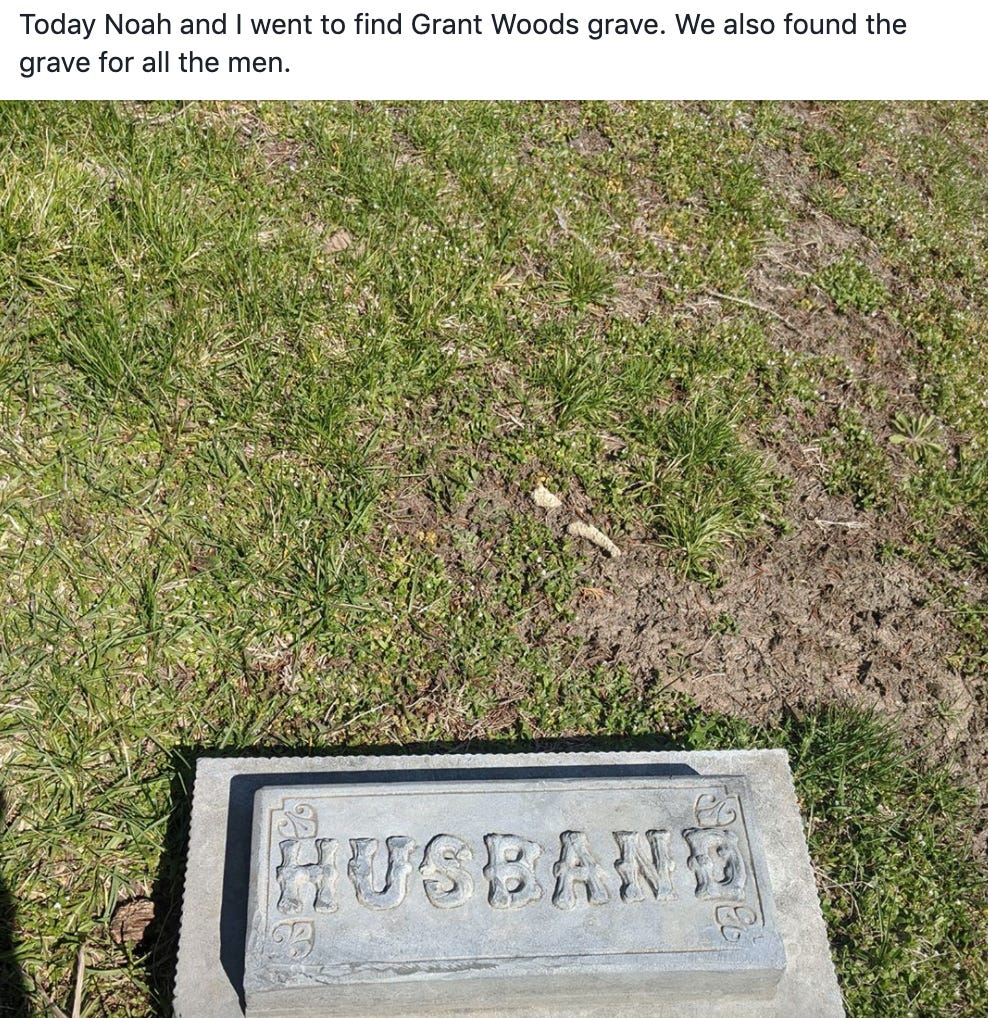Today’s post comes to you via witch Sarah Wheeler, the author of the newsletter Momspreading: The inexpert endeavors of a supposed parenting expert. You can check it out here!
On a Monday in early May, a dark purple cloud began to engulf my phone screen. I had dropped this phone, a refurbished replacement for my last one, on the very day I got it, resulting in a web of small cracks across the bottom left-hand corner. Like any reasonable adult, I had meant to order a protective case, but I began obsessing over buying one used, you know, because of the contributions of manufacturing and shipping to global warming, and after a few fruitless searches I became frustrated and abandoned the task. When I finally accepted that I would need to buy a brand new case, I realized I needed one that was brightly colored or I would constantly lose it, but all of the colorful cases were more cosmetic than protective, and then I frustration-abandoned that, and by that time the phone had arrived, and I could not wait for the duration of an Amazon Prime shipping cycle to open it, and so it went out into the cold hard world unprotected.
That first crack turned into more cracks as I proceeded, over the next several months, to drop the phone again and again; on grass, hardwood floors, concrete, and more than once on the streets of my hometown of Oakland, from the wide-slotted, not-at-all-meant-to-contain-a-phone basket of my fast-moving bike. Because the plastic screen protectors I had ordered ended up being for a slightly different phone, which I had not noticed because I was trying to just get one goddamned thing accomplished and felt the need to do it quickly, several of those cracks conjoined to create one big super crack, which led to an entire chunk of the screen falling off of the phone completely, revealing the circuitry beneath it like the Terminator suffering a flesh tear. Finally, in the days leading up to the appearance of the purple cloud, despite my husband’s warnings, I repeatedly used my phone dangerously close to the pool at a family resort. It stands to reason that water eventually seeped into the phone, leaked into some inner wiring that had the power to, if provoked, dispense purple clouds, and, in the span of a few hours, turned my entire screen black.

This was not the first phone I’d broken. Not even the first this year. But my five-year-old son, often unfazed by death and loss, was deeply upset about the gruesome and drawn-out demise of this poor, unsuspecting phone. When we finally laid it to rest, he took the new phone and somberly placed it in the old case. “Mama,” he said, with the gravity of a priest giving the final blessing over a casket, “now whenever you see your new phone, you will be reminded of your old one, which you loved, even though you kept dropping it.”
When people ask me what it is like to be ADHD, or to be a mother with ADHD, or how having ADHD is any different from just being a frazzled, sleep-deprived, overextended parent, the phone saga provides an apt metaphor. Sure, we’ve all dropped things, broken them, acted stubbornly or impulsively, taken something closer to a pool than we should have. But it is the exponential impacts of all of these minor snafus, swirling together in a perfect clusterfuck of both exceptional and mundane incompetence that I most associate with my own ADHD. When I tell these tales, in this detail (and I rarely do this around non-ADHDers anymore), people start out nodding in agreement but at some point the nodding is replaced by an awkward, concerned expression. As my son demonstrated, ADHD is also receiving disappointed lectures, often about topics more serious than a dumb cell phone, from the people who love you, who in some but not all cases are the only people who truly understand the extent of your dysfunction.
Russell Barkley, one of the many old white dudes who have formed our society’s ideas about what is and isn’t ADHD, calls ADHD an “intention deficit.” I don’t always love the way Dr. Barkley talks about ADHD, but this one resonates. It turns out ADHD is not so much about paying attention, though there’s plenty trouble there to go around, but more about not being able to carry out the plans you had every intention of doing. Having new ideas constantly waylay perfectly good old ones, getting stuck on one thing at the expense of more important ones, making a conscious effort to treat this phone better than the last three but never for a second translating that effort into action.
Like a lot of things in this cruel, beautiful world, ADHD has long been studied, defined, and discussed almost entirely by men. Because one of the original hallmarks of ADHD is what I call “squirrellyness” (and the stiffs call “hyperactivity”), girls who don’t act like that, or who show their squirrellyness in more, well, girly ways, like talking a lot (me) or charming their teachers into letting them leave class and roam the hallways (also me), have just gotten on the radar of ADHD experts in the last decade or so. Adults with ADHD also confound the compartmentalized thinking of experts, because they usually lose the hyperactivity, they don’t have grades and report cards to provide constant proof of their impairment, and they self-medicate with caffeine, alcohol, and well, all kinds of fun things. And adult women??? Adult women are slowly outing themselves as ADHD and even more slowly catching the eye of the mainstream ADHD media, but we still struggle to get diagnosed and treated. In the moms with ADHD groups I am a part of, many women tell stories of being gaslit by psychiatrists or told that just because they couldn’t cut it as working moms didn’t mean they were ADHD. There is nothing more awesome than seeking help and being called a “malingerer,” but it wouldn’t be the first time that the medical community has handled women this way.
Funnily enough, I happen to diagnose ADHD for a living. It is one of my specialties as an educational psychologist, and though I certainly noticed that I shared some personality traits with some of my favorite ADHD clients, it had not occurred to me that our challenges might be different flavors of the same quirky cuisine. I was diagnosed just over a year ago, on a Zoom call with a very thoughtful and not-at-all-gaslight-y psychiatrist, which I agreed to go to only to appease another recently diagnosed mom friend who kept giving me the “come-to-ADHD-Jesus” talk every time we saw each other.
What the diagnosis did for me was not just only provide a reality-check about all of my unsavory patterns, but also give me the permission to name and enjoy the gifts I share with other ADHDers - intersectional thinking, hyperfocus, spontaneity, attention to detail, unbridled enthusiasm for the things I truly love (don’t tell my son, but my cell phone is not on this list). I have compared my brain to a bachelorette party at a Dave & Buster’s. And there’s a lot of crazy in that. But also, Dave & Buster’s is pretty fun when you’re in the mood for it.
I spent this whole last year writing about what my ADHD diagnosis means and doesn’t mean. And it’ll take a lot more processing to figure that out. But the long and short of it is this: self-awareness is one of the greatest privileges of being human, it separates us from the flamingoes, and I feel damn happy, and damn lucky, to have a little bit more of it than I did as a new mother, or a little girl roaming the hallways. And there’s something grounding about accepting and even expecting that I will destroy every single phone I ever have. It’s a small price to pay for personal discovery.
Check out Sarah’s newsletter, Momspreading!
End credits
I hope you enjoyed this guest issue of Evil Witches, a newsletter for people who happen to be mothers and their supporters. If you have any questions, feedback, ideas for guest posts, or suggested topics for the newsletter you can reply right to this email. You can follow us on Instagram here and talk to other witches on Twitter, too.
If you haven’t, please consider supporting the newsletter’s independent, nonsponsored work (which is actually occasionally helpful and enjoyable, I am told) and joining the subscription level (less than a dollar a week!), which gives you extra context and access to the discussion threads which always make me laugh and get great ideas and feelings too.
One witchy thing
(Happy Fathers Day to you dad readers. Luv ya.)






I spent a good part of the pandemic beating myself up for losing multiple debit cards (despite not going to stores?), frustrated that I was getting distracted working from home, and buying so many things online to get organized that are just in piles in our spare room. When my therapist began exploring the possibility of a diagnosis, I spent time in denial. With acceptance (and meds), I feel like a new person.
Yes! It’s so refreshing to hear ADHD discussed in terms of how it applies to adult women. I was diagnosed at 20 after a lifetime of report cards that said “if she could just focus…” and “Marcail isn’t living up to her potential.” The same semester that I was on College Jeopardy I also got a 1.8 GPA. Part of it was because I was having so much fun, but a bigger part was that I just couldn’t do the thing.
I recently switched from Adderall XR to Vyvanse after finding a female integrative psychiatrist who took my whole health picture into account, and it’s been a great change. Still, the behaviors that I’ve learned and skated by on for DECADES are so hard to unlearn as a 41 year old working mom of two young kids.
Thanks for shining a light on what this (insert swirling hand gesture here) feels like.